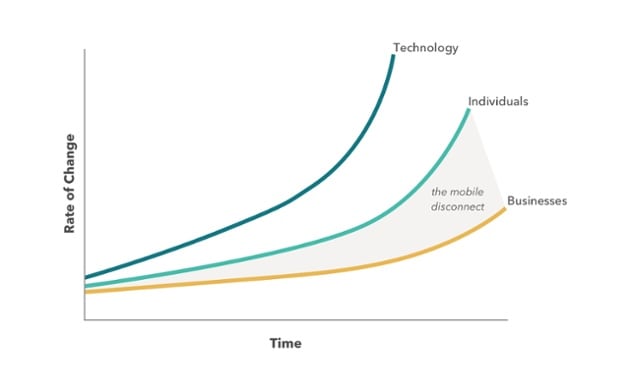In today’s society, everything is connected—the Internet of Things, social media networks, and the increasing use of smartphones. However, as we continue to increase connectivity, humans are becoming incredibly disconnected, especially in the business world. A report from Deloitte outlines a significant gap between technology and organizational habits, identifying it as one of the forces driving major change in the workplace. As technological change increases, so do business productivity, however, there is still a large gap in performance potential between the two (see figure below). The cause of this gap, Deloitte says, is how businesses organize and manage themselves and their employees.

The gap in performance potential between technology and businesses can be further broken down into smaller gaps related to four main aspects: technology, individuals, businesses and public policy (we’ll be focusing on the first three for this example). The figure below shows how technology is changing at an almost exponential rate, and individuals are not far behind in adopting new technologies. Businesses, on the other hand, are slower in adoption, creating a disconnect between the two groups.

The mobile disconnect
While there are many reasons behind the gap between individuals and businesses adopting technology, at Nudge we identified one aspect that is particularly pressing—the mobile disconnect, a gap between employees mobile usage in the workplace and the lack of businesses understanding the benefits of mobile and BYOD.
Why is it a problem?
Mobile disconnect causes two problems in an organization—lost productivity and a lack of trust. Nudge recently conducted a survey of 1,000 millennials and 1,000 Gen X employees in the UK, across a variety of industries, and found 51% of employees believe using mobile devices at work helps them do their job better. However, only 23% of those surveyed said they felt encouraged to use mobile devices when at work. In frontline roles, mobile is being used for communicating with colleagues, answering customer questions, and accessing additional product information, all of which enhances the customer experience, and in turn, helps to increase sales.
Potential productivity and revenue are lost when employees are not encouraged—or worse, actively discouraged—to use mobile devices at work. Employees know using their mobile devices helps them with their jobs, but 42% worry their managers think they’re using their mobile devices for personal reasons and 30% use them discreetly in order to avoid judgment. All in all, 29% believe there is a trust issue around using mobile devices at work. Considering millennials highly value open relationships with managers, a lack of trust is detrimental to an organization.
What causes the mobile disconnect?
1. Late Adoption
Organizations have been late to adopt mobile technologies and BYOD policies, especially in industries with highly distributed workforces such as retail and hospitality. Of employees working in these sectors, only 5% feel the use of personal devices is encouraged in the workplace, despite having BYOD acceptance rates of approximately 30%. With smartphone penetration rates upwards of 80% in the UK, organizations are now playing a game of catch up with their employees.
2. Broken telephone
The mobile disconnect is also occurring due to lack of communication, resulting in confusion and misunderstanding between employees and management. Employees are unsure if they’re allowed to use their mobile devices in the workplace, with 26% completely unaware of their organization’s BYOD policy.
3. Lack of trust
Two-thirds of employees (62%) identify cultural barriers to using their mobile devices at work. Even when using mobile for work purposes, employees still experience worry, fear, and a lack of trust when using their phones at work. These feelings discourage employees further from using their devices, despite their belief that they help them do their jobs better.
Employees are using their mobile devices in the workplace, while organizations and their BYOD policies are being left behind. The disconnect between companies and their employees is leading to a loss in productivity and is being exacerbated in sectors with dispersed, non-desk workforces.
To learn more about the mobile disconnect and how your business can start benefiting from using mobile technology at work, take a look at our 2017 Market Research Report.

